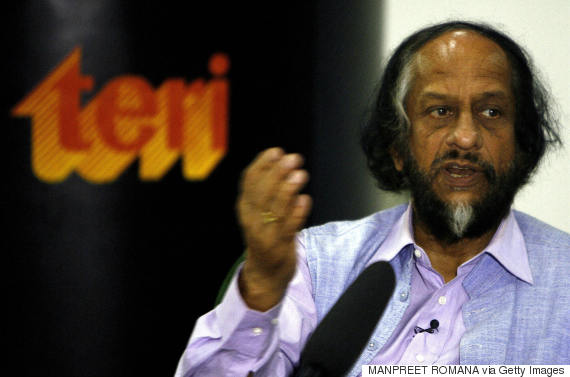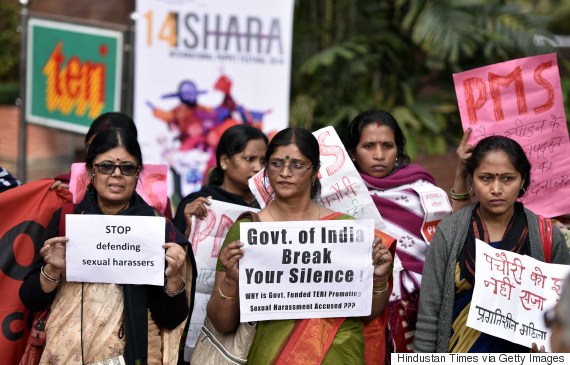Former TERI director general RK Pachauri has broken his silence on the sexual harassment case he is battling in a series of interviews to British newspaper 'The Guardian'. In the article, penned by the publication's environment editor John Vidal, RK Pachauri offers a curious defence - that his email accounts were misused and manipulated by the complainant herself to frame him. He also said that he suspected people and organisations who resent his work against climate change, have orchestrated the incident to 'destroy' him.
Vidal's article begins with glowing praise for Pachauri's work and personality - the writer calls him 'charismatic' - and then goes on to state that he has been forced to lie low in Delhi.
Setting the tone for the rest of the article, where the reporter and writer's sympathies are clearly with Pachauri, Vidal says, "He had weathered vicious attacks by sceptics and steered the IPCC to worldwide acclaim."
Soon after informing his readers that the case against Pachauri was filed when he was not in the country, Vidal laments how the man who has founded 'the huge energy research institute which has taken solar lighting to hundreds of millions of Indians' is has now facing 'ruin and disgrace' where as his 'enemies are revelling in his discomfort'. While Pachauri may have every right to feel that way, it is not clear how the reporter himself has come to draw the above mentioned conclusions. The enemy and ruin theory has not been attributed to Pachauri as a quote, it comes as the writer's own statement.
![rk pachauri]()
Pachauri goes on to indicate that the complainant in the case, a researcher with TERI who later quit the organisation,
had compromised his email accounts. He says: "What is disturbing [is] that right from the first day over a period of about 16 months she was creating and assembling an archive of messages, which to anyone would seem very unusual. As far as I know, the emails, text messages etc that she collected were personal, semi-personal and only in a few cases official."
"I was, during that period, extremely busy and carrying out email communications on six different email accounts. These included my Yale, IPCC, Teri official, Hotmail as well as Gmail accounts. I generally corresponded with her on my Gmail account, but since I had a huge volume of messages to deal with I did not frequently read my messages, except when I was alerted about a message waiting for me. When I did access this account, I would only read unread messages. Honestly, how many of us check our sent items regularly?"
The Guardian, in the article, however, seems to have chosen to ignore the response of the complainant in the case. A copy of the correspondence, which HuffingtonPost India is in possession of, shows that her lawyer has clearly countered these claims. He tells Vidal over email that not only did they have proof of Pachauri's advances made via WhatsApp, SMS, and email, police have verified the IP addresses and mobile tower locations from which these messages have been sent to establish that the complainant could not have sent them herself. A natural journalistic response to Pachauri's claims would be to ask how did one woman manage to 'hack' his WhatsApp, SMS services and email? Not sure if The Guardian writer followed it up. More so, the lawyer also informed Vidal that TERI has till now refused to provide access to its internal servers to the Delhi Police, a piece of information the article has not mentioned either.
Pachauri accused the woman of replacing names of other women in poems saved in his computer with hers and emailing them to herself from his accounts. It is also alleged that the complainant sought a new position higher up in the hierarchy of TERI, which would require Pachauri to give her two promotions. However, the article doesn't indicate if Pachauri has any correspondence from the woman to back his claim.
![sexual harassment india]()
The article also quotes generously from documents, reportedly filed by Pachauri's lawyers in the Delhi court, where the woman has supposedly 'actively flirted' with Pachauri. One of the documents quotes the woman as saying, "Remember how I first met you and what followed next? It was all the inside of me telling me that I must pursue it with this particular man. I will be happy with what makes you happy as long as that brings you satisfaction and sense of belonging.”
Vidal also includes the quote of a TERI employee who wonders aloud why the complainant took so long to report the harassment case and how they all, adoringly, call Pachauri 'Patchy'.
The article says, "He says he suspects strongly, but cannot prove, that there has been a coordinated attempt to destroy him professionally and personally and that money may also be involved." Vidal seems to have not pressed Pachauri to elaborate, in less unambiguous terms, on how a political lobby to disavow his work and the allegations of a researcher could be connected.
It is also not clear if Vidal reached out to the women who comprised TERI's internal complaints committee which found Pachauri guilty of sexual harassment in May 2015. The panel comprised Ranjana Saikia, Suruchi Bhadwal, both employees of TERI and Sonal Mattoo from the NGO Helping Hands. After implicating Pachauri in the report, the ICC team leader, Saikia, abruptly went on leave and resigned in September 2015. The Guardian article neither mentions the ICC report, nor does it seem like the reporter questioned Pachauri on the subject. What agenda could TERI's own panel have against him? The article or Pachauri doesn't attempt to answer the question.
![sexual harassment india]()
The report doesn't mention that Pachauri's lawyers questioned the findings of TERI's own internal complaints committee and accused it of being false and through an industrial tribunal, secured a stay on its implementation.
Earlier this month, the Delhi Police had filed a 1400-page long chargesheet in the case, booking Pachauri under five sections of the Indian Penal Code - assault or criminal force to a woman, outraging her modesty, sexual harassment, stalking, and criminal intimidation.
Police also rejected Pachauri's lawyers claims that his computers and email accounts had been hacked into and had sent the said electronic devices for forensic examination. Vidal's report makes no mention of the latter. The reporter also doesn't seem to have questioned Pachauri how despite being the head of an organisation as vast and organised as TERI, his email and other personal accounts had been left either open or vulnerable for the kind of misuse that he alleges. What Vidal says though is this: "Until then, the man who as much as anyone persuaded the world to act on climate change is unable to act himself."
Vidal's article begins with glowing praise for Pachauri's work and personality - the writer calls him 'charismatic' - and then goes on to state that he has been forced to lie low in Delhi.
Setting the tone for the rest of the article, where the reporter and writer's sympathies are clearly with Pachauri, Vidal says, "He had weathered vicious attacks by sceptics and steered the IPCC to worldwide acclaim."
The enemy and ruin theory has not been attributed to Pachauri as a quote, it comes as the writer's own statement.
Soon after informing his readers that the case against Pachauri was filed when he was not in the country, Vidal laments how the man who has founded 'the huge energy research institute which has taken solar lighting to hundreds of millions of Indians' is has now facing 'ruin and disgrace' where as his 'enemies are revelling in his discomfort'. While Pachauri may have every right to feel that way, it is not clear how the reporter himself has come to draw the above mentioned conclusions. The enemy and ruin theory has not been attributed to Pachauri as a quote, it comes as the writer's own statement.

Pachauri goes on to indicate that the complainant in the case, a researcher with TERI who later quit the organisation,
had compromised his email accounts. He says: "What is disturbing [is] that right from the first day over a period of about 16 months she was creating and assembling an archive of messages, which to anyone would seem very unusual. As far as I know, the emails, text messages etc that she collected were personal, semi-personal and only in a few cases official."
"I was, during that period, extremely busy and carrying out email communications on six different email accounts. These included my Yale, IPCC, Teri official, Hotmail as well as Gmail accounts. I generally corresponded with her on my Gmail account, but since I had a huge volume of messages to deal with I did not frequently read my messages, except when I was alerted about a message waiting for me. When I did access this account, I would only read unread messages. Honestly, how many of us check our sent items regularly?"
The complainant's lawyer also informed Vidal that TERI has till now refused to provide access to its internal servers to the Delhi Police, a piece of information the article has not mentioned either.
The Guardian, in the article, however, seems to have chosen to ignore the response of the complainant in the case. A copy of the correspondence, which HuffingtonPost India is in possession of, shows that her lawyer has clearly countered these claims. He tells Vidal over email that not only did they have proof of Pachauri's advances made via WhatsApp, SMS, and email, police have verified the IP addresses and mobile tower locations from which these messages have been sent to establish that the complainant could not have sent them herself. A natural journalistic response to Pachauri's claims would be to ask how did one woman manage to 'hack' his WhatsApp, SMS services and email? Not sure if The Guardian writer followed it up. More so, the lawyer also informed Vidal that TERI has till now refused to provide access to its internal servers to the Delhi Police, a piece of information the article has not mentioned either.
Pachauri accused the woman of replacing names of other women in poems saved in his computer with hers and emailing them to herself from his accounts. It is also alleged that the complainant sought a new position higher up in the hierarchy of TERI, which would require Pachauri to give her two promotions. However, the article doesn't indicate if Pachauri has any correspondence from the woman to back his claim.

The article also quotes generously from documents, reportedly filed by Pachauri's lawyers in the Delhi court, where the woman has supposedly 'actively flirted' with Pachauri. One of the documents quotes the woman as saying, "Remember how I first met you and what followed next? It was all the inside of me telling me that I must pursue it with this particular man. I will be happy with what makes you happy as long as that brings you satisfaction and sense of belonging.”
Vidal also includes the quote of a TERI employee who wonders aloud why the complainant took so long to report the harassment case and how they all, adoringly, call Pachauri 'Patchy'.
The article says, "He says he suspects strongly, but cannot prove, that there has been a coordinated attempt to destroy him professionally and personally and that money may also be involved." Vidal seems to have not pressed Pachauri to elaborate, in less unambiguous terms, on how a political lobby to disavow his work and the allegations of a researcher could be connected.
Vidal also includes the quote of a TERI employee who wonders aloud why the complainant took so long to report the harassment case and how they all, adoringly, call Pachauri 'Patchy'.
It is also not clear if Vidal reached out to the women who comprised TERI's internal complaints committee which found Pachauri guilty of sexual harassment in May 2015. The panel comprised Ranjana Saikia, Suruchi Bhadwal, both employees of TERI and Sonal Mattoo from the NGO Helping Hands. After implicating Pachauri in the report, the ICC team leader, Saikia, abruptly went on leave and resigned in September 2015. The Guardian article neither mentions the ICC report, nor does it seem like the reporter questioned Pachauri on the subject. What agenda could TERI's own panel have against him? The article or Pachauri doesn't attempt to answer the question.

The report doesn't mention that Pachauri's lawyers questioned the findings of TERI's own internal complaints committee and accused it of being false and through an industrial tribunal, secured a stay on its implementation.
Earlier this month, the Delhi Police had filed a 1400-page long chargesheet in the case, booking Pachauri under five sections of the Indian Penal Code - assault or criminal force to a woman, outraging her modesty, sexual harassment, stalking, and criminal intimidation.
Earlier this month, the Delhi Police had filed a 1400-page long chargesheet in the case, booking Pachauri under five sections of the Indian Penal Code.
Police also rejected Pachauri's lawyers claims that his computers and email accounts had been hacked into and had sent the said electronic devices for forensic examination. Vidal's report makes no mention of the latter. The reporter also doesn't seem to have questioned Pachauri how despite being the head of an organisation as vast and organised as TERI, his email and other personal accounts had been left either open or vulnerable for the kind of misuse that he alleges. What Vidal says though is this: "Until then, the man who as much as anyone persuaded the world to act on climate change is unable to act himself."